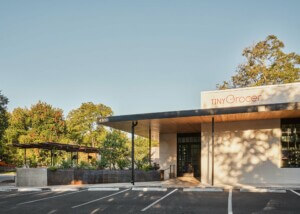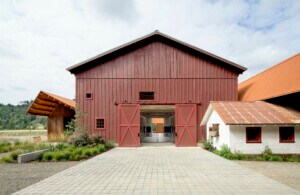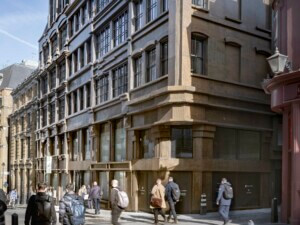For 47 years, the Lakeview Pantry on Chicago’s North Side has provided for the poor and hungry. Through food distribution and self-help initiatives and programs, the pantry has become a staple of its immediate neighbors as well as the greater Chicago community. When it came to establishing its first permanent space, the much-lauded organization turned to local firm Wheeler Kearns.
Originally known as the People’s Pantry of Lakeview, the organization was spread out among a variety of buildings throughout the neighborhood, often with administrations and operations in separate spaces. An adaptive reuse project, the new Lakeview Pantry brings the entire operation under one roof a few blocks from Lake Michigan, nestled up against the overhead L tracks.
Wheeler Kearns’s design for the 7,500-square-foot two-story space brings together the Pantry’s food distribution and social services programs, as well as the administrative staff, with connected spaces and natural light. The lower level includes the waiting area with a distribution counter, walk-in freezer-cooler, dry storage, and sorting room. The goal of the public face of project was to match the Pantry’s own mission by providing a dignified space for those in need. The bright front space serves over 8,000 people a year, with over 800 tons of food distributed in the form of 14-day supplies, so the front of house sees a lot of traffic and a lot of food.
Bathed in sunlight, a wood staircase leads to the upper level. Efficiently laid out offices fill the majority of the upstairs. Much-needed private meeting spaces, a conference room, a shared lunchroom, and open staff office space are lit from above and from the two ends of the thin building.
While the project was only recently finished, it has already been recognized with the Richard H. Driehaus Foundation Award for Architectural Excellence in Community Design, an annual award given to outstanding built community-design projects in Chicago.
“When you work with an organization whose mission is so powerful and important, and they approach that mission with such vigor and earnestness, it is pretty easy to get behind it,” said project architect Danny Wick when he received the Driehaus award at the end of February. “Asking for help can be a pretty undignified thing to have to do. To try and bring a dignified experience to that, and recognize that good design is not only reserved for the wealthy, but that everybody can gain from design, was always the goal.”










